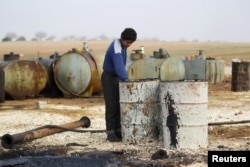Closing the sole remaining area along the Syrian border where foreign fighters can enter and leave Islamic State-controlled territories is one of the top priorities of U.S.-led coalition forces, according to U.S. Secretary of Defense Ash Carter.
Speaking Friday in Colorado, Carter said "sharing and fusing" information across the battlefield is helping to prevent attacks and restrict foreign fighters' movements.
"Specifically, DoD [Department of Defense] is sharing what it collects from the battlefield with other domestic departments that are the leads for screening and watchlisting," the Pentagon chief said.
Fingerprints retrieved from IEDs (improvised explosive devices, or roadside bombs) and personal information gleaned from captured terrorists are added to a database known as the Biometrics Enabled Watchlist, available to all government departments and to U.S. allies, Carter said.
During meetings earlier this month in Germany with members of the anti-IS coalition, Carter said they discussed efforts to drive Islamic State fighters out of the Manbij area of Syria. This region near Aleppo "is a critical transit point for terrorists planning to execute attacks outside Iraq and Syria," Carter said. "Together we must close this last entry-exit area for foreign fighters into Europe and beyond, once and for all."
Diminishing returns
The Islamic State group has seen its oil revenues decline by 50 percent, and the number of foreign fighters joining the Islamist extremist group is down by as much as 75 percent, a U.S. military official said Friday.
Colonel Steve Warren, a spokesman for the anti-Islamic State operation in Iraq and Syria, told reporters at the Pentagon via teleconference from Baghdad that U.S.-led airstrikes targeting Islamic State oil tankers and wells have been a factor in shrinking Islamic State's income, along with falling oil prices.
"We attribute the reduction in foreign-fighter flow to a range of factors, including our military gains on the ground, as well as active steps by governments to strengthen and enforce border security and also counter-recruitment efforts," Warren added.
‘Shoving match' in Syria
Despite the Islamic State fighters' continuing loss of territory in Iraq, Warren said, the extremists have taken control of two small towns in northwestern Syria near the Turkish border.
The U.S. officer said a "shoving match" is in progress between IS fighters and other Syrian rebel groups in the area known as the Marea Line.






